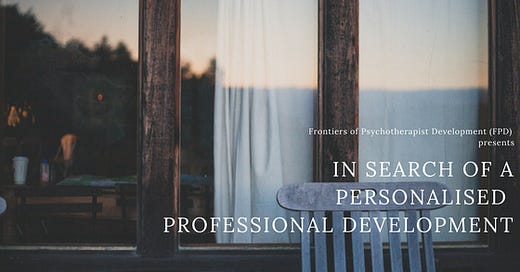In Search for a Personalised Professional Development
Updates by Daryl Chow, MA, Ph.D.(Psych)
View this email in your browser
In Search for a Personalised Professional Development
By Daryl Chow, MA, PhD on Jan 14, 2018 10:20 pm
Photo by Logan Adermatt
The aim of Frontiers of Professional Development (FPD) became clear to me only a few months back, even though FPD has been around for a few years now. At the heart of FPD is to help individuals and teams design a personalised professional development plan.
Why? For those who won’t settle for being average, better designs for significant learning can shift the tide in our therapy model obsessed enterprise, and help each therapist become the best versions of themselves.
Invest in Therapists, Not Therapy.
I suspect the push for adherence, competency, and treatment fidelity to specific treatment approaches were predicated from our obsession with standardisation of education – the way Edward Thorndike took Frederick Taylor’s idea of standardisation to improve productivity in manufacturing industries, which permeated into our factories and education system.[1]
Yet, after more than 50 years of debate in our field [2], what we really need is to step out of the “type and rank” mentality- which therapy is better than that therapy for this or that disorder – and invest in helping each individual practitioner design their unique therapeutic style.
Please, No More American Idols.
Though many of the contestants might indeed have great voices, we don’t need another American Idol, X Factor or The Voice singer. We are sold the promise of fame, but Fremantle Media is more interested in the fame of the shows than the individual’s future.
We need more Bob Dylans, Leonard Cohens, and Patti Smiths of our generation. Though their voices were far less palatable than reality TV talents, their voices are far more likely to stand the test of time.
We don’t need you to model after another model. Gone is the industrial age. Besides, most theories that are developed from master therapists were developed after the fact.
Why shouldn’t you and I develop our own theories-or better yet, develop our own set of guiding first principles?[3] I suspect many of us are already doing so. We attend and read an array of workshops and books, and we put every ouch of effort to piece it all together in our clinical practice.
Meanwhile, every now and then, a clinical supervisor or a professor comes and says, you’ve got to stick to a model in order to deliver good work. That’s how entrenched we are in the model specific mentality. Even when we say we are integrative, we are really still thinking from a “model” mindset; just combining one model with another.
Many post-graduate schools still insist CBT be the primary model to be taught, when in fact the evidence is clear, CBT is not superior to other bona fide treatment approaches.[4]
The idea of deliberate practice is not spared of “model” mindset. We say that we need to do deliberate practice in dynamic/EFT/ACT/CBT. As if getting better in a particular theoretical orientation is going to get you better, when we know that model adherence accounts for close to zero in outcomes.
The Factory of Schools
Author of Thinking Statistically, Uri Bram was asked why he was conflicted about the benefits of going to university. He said, “In schools, we are asked to complete fixed tasks. But in real life, we need to figure out WHAT tasks to work on.”
If we are to get better results with our clients, we need to figure out the What to work on before the How.
Therapists need to become better learners. To see the world, absorb with intentionality, go deep, go lateral, and bring the full force of the fruits of our learnings into the therapy room. I doubt that any one particular treatment approach is going to teach you that, as standardised or empirically-supported as it may be.
Overthrow Standardisation
The best form of standardisation is customisation.[5] Our profession is a personal profession. Your identity, beliefs, personality, ways of seeing the world and organising principles will influence the way your clients experience you in therapy.
Forget conformity. I don’t think we should be sleeping better just so because we are doing some therapy that is touted to be “evidence-based.” What’s more critical is do you have your evidence? Borrowing an evidence from elsewhere based on an averaged group should not be considered best practice.
“… We are talking in boxes, and these boxes do not change. I really think we need to begin to stretch our hands outside of the boxes and touch our colleagues.”
~ From the late Salvador Minuchin (1921-2017), at the evolution of psychotherapy 2009 conference.
It’s time we help each other to develop as individuals within a community, and not make individuals conform to a community. We need heterogeneity, not homogeneity.
Your clients need you, not a copy of someone else.
Footnotes:
[1] Todd Rose, 2015, The End of Average.
[2]Miller, S. D., Hubble, M. A., Chow, D. L., & Seidel, J. A. (2013). The outcome of psychotherapy: Yesterday, today, and tomorrow. Psychotherapy, 50(1), 88-97. doi:10.1037/a0031097
[3] Ray Dalio 2017, Principles
[4] Wampold, B. E., Flückiger, C., Del Re, A. C., Yulish, N. E., Frost, N. D., Pace, B. T., . . . Hilsenroth, M. J. (2017). In pursuit of truth: A critical examination of meta-analyses of cognitive behavior therapy. Psychotherapy Research, 27(1), 14-32. doi:10.1080/10503307.2016.1249433
[5]This is likely a paraphrase from Educator Sir Ken Robinson’s TED talk
Recent Articles:
Being Average is Compelling
Figure Out Where You Are Before Knowing Where You Need to Go
Everyone Needs a Coach
Does Your Mindset Really Matter?
The Biggest Stumbling Block Towards Individualised Professional Development






